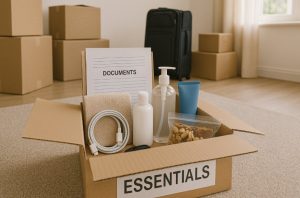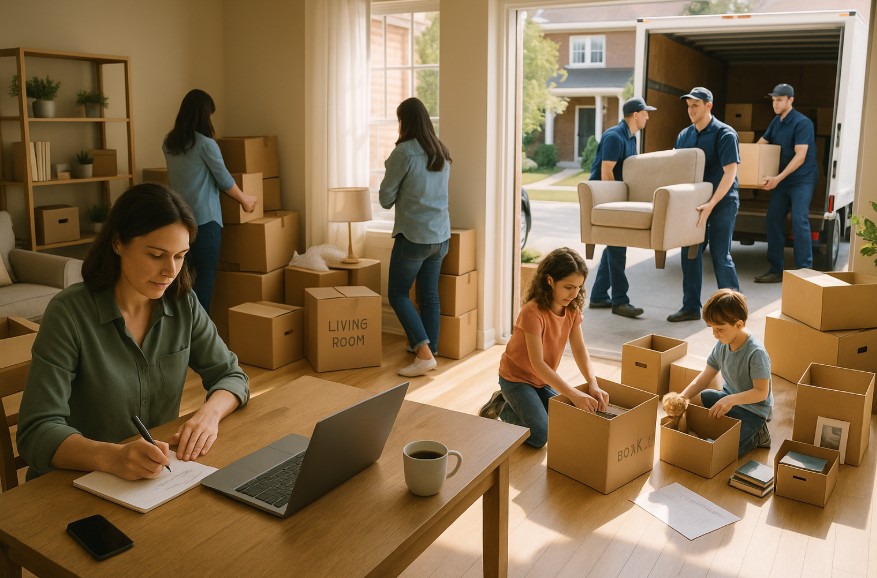Are you preparing to move house and feeling unsure where to start? You’re not alone. Moving house is one of the biggest life changes many people face, and while it can be exciting, it often comes with a long list of tasks and a fair amount of stress.
From packing and paperwork to managing utilities and settling into a new community, it’s easy to feel overwhelmed by everything that needs to be done. But with the right approach, moving house doesn’t have to be chaotic or stressful.
This guide will walk you through the top 10 things to do when moving house in the UK, helping you plan, prioritise, and organise every step of the process.
Whether you’re a first-time buyer, an experienced homeowner, or a renter preparing for a big change, these practical tips will help ensure your move goes as smoothly as possible, saving you time, money, and worry along the way.
Why Is Planning Ahead Crucial When Moving House?
Planning ahead is essential when moving house because it gives you time to organise every detail carefully. Without proper planning, you can easily become overwhelmed by last-minute tasks, forgotten bookings, or unexpected costs. By starting preparations six to eight weeks before your move, you create space to handle paperwork, research moving companies, and set a budget that reflects all your anticipated expenses.
Planning early also helps you avoid peak-time shortages, such as movers being fully booked at the end of the month or during school holidays. You can arrange services like broadband installation, redirect your mail, and notify your landlord or estate agent in good time.
Families with children will also need to arrange school or nursery transfers, which may involve waiting lists or paperwork. Creating a week-by-week checklist helps break the move into manageable stages and reduces stress. Ultimately, good planning leads to a smoother, less stressful move that saves you time and money.
What Should You Pack First for a House Move?

Packing is one of the most time-consuming parts of moving house, so knowing what to pack first can make the process much more manageable. Start by packing non-essential items that you won’t need in the weeks leading up to your move.
These often include seasonal clothing, books, decorative items, photo frames, and kitchen gadgets you rarely use. By doing this early, you free up time for larger and more essential packing closer to the move date.
Packing early also gives you a chance to declutter and decide what you really want to take to your new home. You might find items to donate, sell, or recycle, which can reduce moving costs and make unpacking easier.
Make sure to label all your boxes with the room and contents to avoid confusion later. Fragile items should be carefully wrapped, and you should keep an essentials box separate with daily-use items, so you’re not left searching for necessities on moving day.
How Do You Notify Utilities When Moving House?
Notifying your utility providers before you move house is critical to ensure you are not paying for services you no longer use and to guarantee a smooth transition at your new home. Start by contacting your gas, electricity, water, broadband, and TV licensing providers at least two weeks before your move. Give them your moving date and new address, so they can prepare to close or transfer your accounts accordingly.
On moving day, take final meter readings at your old home and initial readings at the new property. This helps ensure that you only pay for the energy you have used and provides you with evidence in case of any billing disputes.
It’s also important to update your address with banks, insurance providers, HMRC, and the DVLA. Consider setting up a Royal Mail redirection service to capture any post you might miss. Early notification avoids service gaps and protects you from unnecessary costs during the transition.
Why Should You Clean Your New Home Before Moving In?

Cleaning your new home before you move in is one of the smartest things you can do to ensure a fresh and healthy start. Even if the previous owners or tenants cleaned before leaving, there are often hidden areas that need attention, such as inside kitchen cupboards, behind appliances, or under bathroom fixtures. Giving your new home a deep clean allows you to move into a truly fresh space and makes unpacking much more pleasant.
Start with essential areas like the kitchen and bathrooms, where hygiene matters most. Wipe down surfaces, disinfect sinks, clean toilets and showers, and vacuum or mop floors. If you have carpets, consider steam cleaning them, especially if the previous occupants had pets.
Changing the locks adds a layer of security, as you can never be sure who might still have a key. Lastly, check smoke alarms and carbon monoxide detectors to ensure your home is safe and compliant before you settle in.
How Can You Settle Into Your New Neighbourhood Quickly?
Settling into a new neighbourhood is just as important as settling into your new home. Once you’ve unpacked the basics, take time to explore your local area and meet your neighbours.
Introducing yourself with a friendly hello can go a long way towards feeling welcome and connected. Neighbours can also provide helpful local tips, such as the best shops, cafés, parks, or public transport routes.
Walking or cycling around your neighbourhood is one of the best ways to familiarise yourself with your surroundings. Take note of local amenities like doctors’ surgeries, dentists, schools, and community centres. Register with a local GP and update your electoral roll to ensure you’re eligible for local services.
If you have children, research local clubs or sports activities to help them settle in and make new friends. Building relationships in your neighbourhood creates a sense of belonging, turning your new house into a true home.
10 Things to Do When Moving House
1. Make a Moving House Checklist UK

Creating a moving house checklist is one of the most effective ways to stay organised during your move. A checklist helps you break down the entire process into clear, manageable steps, reducing the chance of forgetting important details.
Start by outlining key tasks such as confirming your moving date, booking a removal service, notifying utility companies, and packing. Assign deadlines to each task and prioritise them based on urgency.
A good checklist also covers things like notifying your landlord or estate agent, arranging school transfers if you have children, and sorting home insurance for your new property. By following your checklist, you can track your progress and avoid last-minute stress.
It is helpful to include tasks for after you move as well, such as unpacking, registering for council tax, and updating your address with important organisations. With a clear list guiding you, you’ll feel more confident and prepared at every stage of the move.
2. Declutter and Donate Unwanted Items

Before you start packing, take the opportunity to declutter your home. Moving house is the perfect time to evaluate what you truly want to keep and what no longer serves you.
Go room by room and assess your belongings carefully. Ask yourself whether you’ve used the item in the past year and whether it has a place in your new home.
Items that are still in good condition but no longer needed can be donated to charity shops, given to friends or family, or sold online. Larger furniture pieces that won’t fit in your new space can sometimes be collected by local charities or recycling centres.
By decluttering, you reduce the number of boxes you need to pack, making your move lighter and potentially lowering removal costs. You also avoid bringing unnecessary clutter into your new home, allowing you to start fresh and organised. Decluttering can be time-consuming, so start early.
3. Arrange Professional Movers or Van Hire

Choosing the right moving company or van hire is a critical part of any house move. Professional movers can save you significant time and physical effort, especially if you have heavy or delicate items like furniture, appliances, or antiques. Start researching removal companies several weeks before your moving date to compare prices, services, and customer reviews.
Get at least three quotes and check whether the companies offer insurance to cover your belongings during transit. If you are planning a smaller move or feel confident managing the lifting yourself, hiring a self-drive van can be a more budget-friendly option.
Make sure to choose the right vehicle size for your needs to avoid multiple trips. Booking early is particularly important if you’re moving at peak times such as weekends or school holidays. Confirm all details in writing, including the date, time, and any special requirements, to ensure the moving day runs smoothly and on schedule.
4. Pack an Essentials Box for Moving Day

An essentials box is one of the most useful things you can prepare for moving day. This box contains the items you are most likely to need during and immediately after the move. Without it, you may find yourself digging through dozens of boxes looking for your phone charger, toilet paper, or kettle after an exhausting day.
Good essentials to pack include important documents, phone and laptop chargers, snacks, bottled water, basic toiletries, medications, a first-aid kit, and a change of clothes. If you have children or pets, include their favourite toys or comfort items to help keep them calm during the transition.
You might also want to pack basic kitchen supplies such as mugs, tea, coffee, and a small set of cutlery. Keep this box easily accessible during the move, ideally transporting it yourself if possible. Having your essentials at hand will help you settle in more comfortably on your first night.
5. Notify Utilities and Change of Address UK

Notifying utility providers and updating your address is one of the most important tasks when moving house. Begin by contacting your gas, electricity, water, broadband, and TV licensing providers at least two weeks before your moving date. Provide them with your new address and final moving date to arrange the transfer or closure of your accounts.
On moving day, take final meter readings at your old property and initial readings at your new home. This ensures you only pay for the services you have used and avoids billing disputes later. In addition to utilities, notify your bank, building society, insurance providers, HMRC, DVLA, and healthcare providers of your address change.
Royal Mail offers a redirection service that helps ensure no important post is missed. Updating your address promptly helps prevent service interruptions and protects you from fraud or lost correspondence. Taking care of these tasks early gives you peace of mind and a smoother transition.
6. Deep Clean Your New Home Before Moving In

Before you start unpacking boxes and arranging furniture, it’s wise to give your new home a thorough deep clean. Even if the property looks clean, there are often hidden areas that need extra attention, such as inside kitchen cupboards, under sinks, behind appliances, and around window frames. Cleaning before you move in means you can tackle every corner of the space without worrying about working around furniture or boxes.
Focus on key areas like the kitchen and bathrooms, where hygiene is most important. Wipe down surfaces, scrub showers and toilets, and clean floors thoroughly. If the property has carpets, you might consider hiring a professional carpet cleaner or renting a steam cleaner, especially if the previous occupants had pets.
While you are cleaning, it’s also a good idea to check smoke alarms, carbon monoxide detectors, and security locks to ensure they are functioning properly. Starting with a clean slate will make your new home feel fresher and more welcoming.
7. Check Broadband and Set Up Internet

Setting up broadband and internet in your new home should be a priority, especially if you work from home or have children who need access for schoolwork. Waiting until after you move to arrange installation can leave you without service for days or even weeks, so it’s important to plan ahead. Contact your existing broadband provider at least two to three weeks before your move to arrange for a transfer or set up a new service.
Make sure you understand any costs involved, such as cancellation fees or installation charges at the new address. Some providers will allow you to bring your existing router, while others may require new equipment. On moving day, check that all the required wiring and sockets are in place and test the connection as soon as possible.
Having broadband and internet set up promptly helps you stay connected, manage online tasks, and make your transition to the new home smoother and less stressful.
8. Unpack Room by Room to Stay Organised

Unpacking can feel overwhelming, but approaching it with a plan helps keep the process efficient and less stressful. One of the best strategies is to unpack room by room, focusing first on the spaces you use most frequently, such as bedrooms, bathrooms, and the kitchen. This allows you to establish essential routines quickly, like sleeping comfortably, cooking meals, and managing hygiene, without being surrounded by chaos.
Start by setting up beds and bedding so everyone has a place to rest at the end of the day. Next, move to the kitchen to unpack basic cookware, dishes, and food supplies. Save less urgent areas, such as spare rooms, attics, or garages, for later.
Taking this structured approach helps you feel more settled and avoids spreading clutter across the house. Unpacking gradually also gives you time to decide on the best layout and storage solutions for your belongings, making your new home more functional from the start.
9. Register for Council Tax and Local Services

After moving, it is essential to update your local council with your new address so they can register you for council tax. Failing to do this can result in missed bills, fines, or delays in accessing local services.
Contact the council as soon as you move in and provide details such as your moving date and household members. This ensures that your records are up to date and you are billed correctly from the start.
In addition to council tax, take time to register with a local GP, dentist, and optician. This is especially important if you have children or underlying health conditions.
You should also update your details on the electoral roll so you can vote in local and national elections. Find out about local bin collections, recycling schedules, and parking permits, if applicable. Being proactive with local services helps you settle in smoothly and ensures that your household is properly integrated into the new community.
10. Meet the Neighbours and Explore the Area

Getting to know your neighbours and exploring the local area can make a huge difference in how quickly you feel at home. Once you have settled the essentials inside, take time to step outside, introduce yourself to the people next door, and make connections.
A simple conversation can help break the ice and open doors to valuable local recommendations, whether it’s the best café in town, trusted tradespeople, or shortcuts to local amenities.
Walking or cycling around the neighbourhood is a great way to familiarise yourself with the surroundings. Locate important places like shops, schools, parks, post offices, and community centres.
If you have children, find out about local activities, playgrounds, or sports clubs where they can make new friends. For adults, consider joining local groups or attending events to build your social network. Building relationships and understanding your area not only improves your quality of life but also helps you feel secure and supported in your new environment.
Conclusion
Moving house is no small task, but with thoughtful preparation and a clear checklist, it can be a far more positive experience than many expect. By focusing on key steps such as planning ahead, decluttering, arranging the right services, setting up your home, and connecting with your new community, you set yourself up for a smoother transition and a quicker sense of belonging.
Remember, the goal isn’t just to move your possessions from one place to another; it’s to create a new home where you and your family can feel comfortable and settled. By following the top 10 things to do when moving house in the UK, you’ll be able to navigate the challenges with confidence and make your move a fresh start you can genuinely enjoy.
FAQs
What documents should I keep handy on moving day?
You should keep your identification, homeownership or rental documents, mortgage or lease agreements, utility contracts, and important contact numbers close by. Having these on hand prevents delays if unexpected issues arise.
How do I avoid damage during the move?
Use strong boxes, pack fragile items carefully with bubble wrap or newspaper, and label boxes clearly. If using movers, ensure they are insured and experienced with delicate or high-value items.
Should I inform the council when moving house?
Yes. You should inform your local council of your move to update your council tax records. This ensures you are billed correctly and eligible for local services.
What’s the best way to unpack efficiently?
Start with essential rooms like bedrooms, bathrooms, and the kitchen. Unpack room by room to avoid spreading clutter throughout the house. Take breaks to avoid exhaustion and stay focused.
How can I make moving with children easier?
Talk to your children about the move, involve them in packing, and keep familiar items accessible. On moving day, arrange childcare if possible to reduce stress and keep them safe.
When should I change locks in a new home?
It’s recommended to change locks as soon as you move in for security reasons. You never know how many copies of keys might be in circulation from previous owners or tenants.
How do I transfer broadband to a new address?
Contact your provider at least two to three weeks before your move to arrange transfer or installation. Some providers may charge a moving fee or require equipment updates, so check in advance.
Recent Posts




